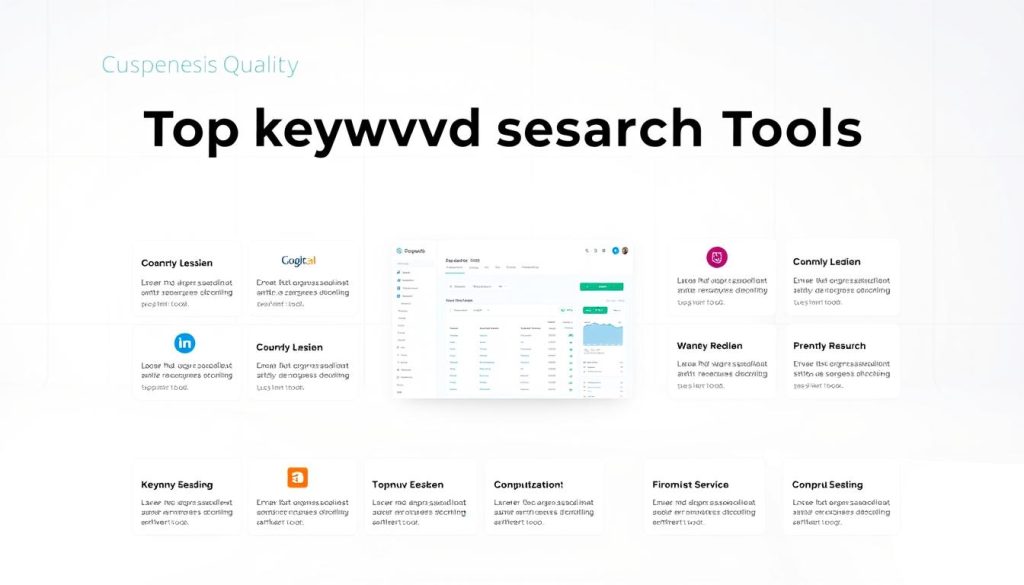Welcome to your complete guide to understanding how proper keyword research powers successful online visibility. Have you ever wondered why some websites consistently appear at the top of search results? The secret often lies in their strategic approach to finding the right terms.
This guide will walk you through the entire process of discovering valuable search terms. You’ll learn how to identify phrases that attract the right visitors. We’ll cover everything from basic concepts to advanced strategies that drive real business growth.
Whether you’re new to SEO or looking to improve your current approach, you’ll find practical insights. These will help you make smarter decisions about which terms to target. We’ll introduce you to top tools available today and compare their features.
By the end, you’ll have a clear roadmap for conducting effective term discovery. This will align with your business goals and boost your online presence. Get ready to transform your approach with strategies that make finding valuable phrases easier than ever.
Table of Contents
Key Takeaways
- Proper term discovery is essential for SEO success
- Strategic planning helps websites rank higher in search results
- This guide covers both basic and advanced techniques
- You’ll learn to identify phrases that attract quality traffic
- We’ll compare various tools to help your decision-making
- The strategies work for beginners and experienced marketers
- Implementation leads to better online visibility and growth
Understanding the Foundation of Keyword Research
At its core, effective keyword research serves as a bridge connecting your business to the exact questions your audience is asking online. It’s far more than just compiling a list of popular words. This process is a fundamental type of audience research.
What is Keyword Research?
Essentially, it’s about discovering the precise language your potential customers use. You learn what they search for when looking for products, services, or information. The goal is to understand their needs and questions as they type them into a search engine.
This discovery process involves analyzing several key factors. You look at search volume data and competition levels. Most importantly, you analyze user intent to find terms that drive qualified traffic.
Why It Matters for SEO Success
When done correctly, this analysis becomes the bedrock of your entire SEO strategy. It informs decisions on content creation, site structure, and technical optimization. Real-world results prove its power.
For instance, Backlinko used strategic research to rank in Google’s top 10 for over 20,000 keywords. This achievement was worth about $756,000 per month in ad value. It shows the immense potential of a well-executed plan.
Mastering these fundamentals allows you to:
- Identify opportunities your competitors are missing.
- Create content that genuinely matches what your audience wants.
- Select relevant terms for SEO that align with your business goals.
This strategic approach moves beyond vanity metrics to deliver real growth.
Top Keyword Research Tools Overview
Choosing the best keyword tool can dramatically streamline your SEO efforts. The right platform helps you find profitable search terms quickly.
It transforms guesswork into a data-driven process. You gain insights into what your audience is truly looking for online.

The power of a good tool lies not just in the data it provides, but in the actionable insights it uncovers.
Comparing Features and Benefits
Each platform offers a unique set of features. Your choice depends on your specific goals and budget.
Some tools excel in competitor analysis, while others are masters of search volume accuracy. It’s crucial to pick one that aligns with your needs.
| Tool Name | Best For | Standout Feature | Free Plan/Trial |
|---|---|---|---|
| Semrush | Search Volume Accuracy | Keyword Magic Tool | 10 searches/day |
| Google Keyword Planner | PPC Campaigns | Forecasts for PPC | Unlimited (with Ads account) |
| Ahrefs | Keyword Difficulty | Volumes for multiple platforms | Limited free data |
| Moz | Fast Data | Keyword « Priority » score | 30-day free trial |
How Tools Enhance Search Volume Data
These platforms do more than just show numbers. They provide context for the search volume data.
They help you understand trends and seasonality. This allows you to target relevant terms for SEO that are both popular and valuable.
By aggregating information from various sources, they give you a comprehensive view. This leads to smarter, more effective optimization choices.
Mastering Free Keyword Research Tools
Modern free keyword tools have democratized SEO, putting powerful capabilities within reach of every marketer. These platforms offer sophisticated features that were once exclusive to expensive paid services.
You can build comprehensive lists without financial commitment. This approach saves valuable time while delivering actionable data.
Exploring WordStream’s Free Keyword Tool
WordStream’s tool provides hundreds of relevant results with competition levels and estimated CPC data. It serves as an excellent alternative to Google’s Keyword Planner.
Simply enter a search term or website URL, select your industry from 24 verticals, and choose from over 23 countries. You’ll instantly see the top 25 suggestions with long-tail variations.
Utilizing Keyword Tool for Long-Tail Suggestions
The standalone Keyword Tool platform leverages Google Autocomplete technology. It generates up to 750+ suggestions in seconds by systematically modifying your initial term.
This free version supports 192 Google domains and 83 languages. It’s perfect for international strategies requiring localized search data.
Leveraging Free Versus Paid Options
Free tools provide substantial value for basic discovery needs. They allow you to experiment with different approaches before investing in comprehensive platforms.
| Feature | Free Tools | Paid Tools |
|---|---|---|
| Keyword Suggestions | Up to 750+ | 2x more keywords |
| Search Volume Data | Limited | Comprehensive |
| Competition Metrics | Basic | Detailed analysis |
| Export Options | CSV download | Multiple formats |
The key advantage of starting with free options is validation of your SEO strategy. You can build initial lists and test approaches without financial risk.
Best Practices with Google Keyword Planner for PPC and SEO
When it comes to reliable data directly from the source, Google Keyword Planner stands as an essential free tool for any marketing professional. This powerful platform feature requires a Google Ads account but delivers unique forecasting capabilities.

Maximizing PPC Campaigns with Accurate Data
The planner excels at helping you maximize paid search campaigns. It provides data straight from Google’s search ecosystem.
You get forecasts for clicks, impressions, and costs. This gives confidence that your targeting aligns with actual user behavior.
While independent testing showed a 40.94% search volume accuracy score, the tool remains valuable. The information comes from Google’s authoritative source.
Integrating Google Ads Insights into SEO
Marketing professionals can create powerful synergies between paid and organic strategies. Terms that perform well in ads often indicate strong organic opportunities.
By analyzing performance data, you discover which phrases convert visitors into customers. This helps prioritize terms for long-term organic growth.
The tool identifies phrases with commercial intent and reasonable competition levels. This allows smarter budget allocation across both channels.
| Feature | Google Keyword Planner | WordStream Free Tool |
|---|---|---|
| Search Volume Data | Ranges provided | Concrete numbers |
| Data Source | Direct from Google | Google API verified |
| Forecasting | PPC campaign estimates | Basic suggestions |
| Best Use Case | Paid search optimization | Complementary data |
« The true power of Google’s native tools lies in their ability to bridge paid and organic search strategies effectively. »
One limitation is the provision of search volume ranges rather than exact numbers. Many marketers use complementary tools for more precise data.
This approach validates your SEO strategy without financial risk. You can test approaches while building comprehensive lists.
Semrush and Competitor Analysis Insights
The competitive edge in digital marketing often comes down to data accuracy, and Semrush consistently proves its superiority. Independent testing reveals this platform leads in search volume precision across multiple comparisons.
Discovering the Keyword Magic Tool
Semrush’s standout feature is the Keyword Magic Tool, which generates hundreds of related suggestions instantly. This powerful instrument provides detailed metrics like search volume and difficulty percentages.
The free plan offers 10 daily searches, making enterprise-level capabilities accessible to all marketers. You can explore various terms without financial commitment.
Benchmarking Against Competitors
The Keyword Gap tool allows comparing your domain against up to four competing websites simultaneously. It reveals shared terms and missing opportunities in your strategy.
You see exact search volumes and ranking positions for each term. This helps prioritize where to focus optimization efforts for maximum impact.
With only 1.78% of keywords « not found » in its database, Semrush offers reliable information for strategic decisions. The platform’s comprehensive coverage gives confidence in your SEO approach.
Exploring Alternative Tools: Ahrefs, Moz, and More
The landscape of SEO tools extends far beyond the most popular options. Specialized platforms provide unique advantages for different business scenarios.

Each alternative brings something distinctive to the table. Understanding their strengths helps you make informed choices.
Strengths and Weaknesses in Tool Comparisons
Ahrefs offers unlimited searches with its Free Keyword Generator. However, you get limited data without a paid plan.
The platform excels with its Keyword Difficulty rating. It provides volume data across Google, Bing, YouTube, and Amazon.
Moz provides a 30-day Pro trial with full feature access. Its standout « Priority » score balances search volume and ranking difficulty effectively.
Serpstat covers 230+ regions, perfect for international campaigns. Sistrix allows 10 daily searches without registration for quick checks.
Mangools includes a helpful « Trend » data column. This shows whether interest in terms is growing or declining.
Choosing the Right Tool for Your Business Needs
Consider accuracy when selecting platforms. Testing shows significant variation between different tools.
The best approach often involves using multiple free options together. This lets you leverage each platform’s strengths while minimizing weaknesses.
Combine tools to build the most comprehensive strategy possible. This multi-platform approach delivers better results than relying on a single solution.
Keyword Research: Strategies for Content and SEO Success
Moving beyond basic discovery, effective strategies connect your content directly to what your audience seeks. This process is about understanding intent, not just finding popular phrases.
It ensures your efforts attract the right visitors who are genuinely interested in what you offer.
Aligning Keyword Search with User Intent
Every search query has a purpose. Users might want to learn, compare, find a specific site, or make a purchase.
Your content must match this intent to rank well and satisfy visitors.
Google uses intent as a ranking signal. Pages that best answer the searcher’s need often appear higher in results.
Balancing Search Volume and Competition
High-volume terms are tempting, but they come with fierce competition. A smarter approach targets phrases with adequate traffic that you can realistically rank for.
Long-tail keywords are perfect for this. They have lower search volume but attract highly targeted visitors.
These specific phrases often convert better because they match clear user needs.
| Keyword Type | Typical Search Volume | Competition Level | Best For |
|---|---|---|---|
| Short-Tail | High | Very High | Brand Awareness |
| Long-Tail | Low to Medium | Low | Targeted Conversions |
| Commercial | Medium | Medium | Lead Generation |
| Informational | Varies | Varies | Building Authority |
Use diverse sources like Google’s Related Searches and forums to find how people discuss your niche. This helps you unlock SEO potential by speaking your audience’s language.
Always validate ideas with real data before creating content. Check search volume, difficulty, and trends.
Remember: The goal is to find terms that balance volume, competition, and relevance to your business.
Practical Keyword Analysis for Marketing Alignment
Effective marketing alignment starts with understanding how search patterns reveal customer needs and opportunities. This approach transforms raw data into actionable intelligence that drives real business growth.
Using Search Volume Data to Drive Targeted Traffic
Search volume data helps you identify high-traffic opportunities. Terms with substantial search numbers indicate strong user interest.
The key is matching content to user intent. Otherwise, you attract visitors who quickly leave without converting.

Analyzing volume trends over time reveals growing topics early. This gives you first-mover advantage before competition intensifies.
Identifying Low-Competition, High-Intent Keywords
Low-competition terms often convert better than broader searches. They attract visitors with specific needs closer to taking action.
For example, « ecommerce email marketing software » gets only 110 monthly searches. But those are likely marketing directors with buying power.
There’s no universal ideal search volume number. Context matters enormously across different industries and niches.
Smart marketers balance their portfolio across competition levels. This builds sustainable traffic and business value over time.
Integrating Keyword Research with Your SEO Strategy
Connecting your term identification process with your broader SEO framework transforms scattered efforts into a cohesive strategy. This integration turns isolated term lists into a powerful content roadmap that systematically improves your website’s visibility.
Content Optimization Techniques
Start by auditing your existing pages using Google Search Console. Look for terms where you’re already ranking but not well. These quick wins represent opportunities where Google sees your content as somewhat relevant.
Optimization should focus on naturally incorporating target terms throughout key page elements. This includes title tags, meta descriptions, headers, and body content. Always prioritize readability while strategically placing important phrases.
Real-World Application Examples
Consider this practical example: Instead of fighting for « best coffee maker » with high competition, target « best mini coffee maker » with better ranking chances. This approach balances search volume with realistic opportunities.
Monitor your performance continuously using tools like Semrush’s Keyword Overview. Track how search volumes and rankings change over time. When primary terms lose momentum, identify rising alternatives that people are using instead.
This ongoing process ensures your website stays relevant as search behavior evolves. It turns term discovery into a sustainable strategy that drives measurable business results.
Conclusion
You now have the complete toolkit for discovering valuable search terms that drive business growth. This guide has shown you how to find the right phrases for your website.
Choosing the right tool is crucial. Free options offer a great start, while paid platforms provide deeper data. The best approach often combines several tools.
Remember, success comes from targeting phrases that match user intent and your business goals. It’s about quality traffic, not just high search volume.
Make this process a regular part of your strategy. The digital landscape changes fast. Keep your content fresh and relevant.
Start applying these techniques today. For a deeper dive into advanced strategies, explore our guide on mastering keyword research for professional success. Your journey to better SEO starts now.
FAQ
What is the best free keyword research tool available?
Google Keyword Planner is a top choice for many. It provides search volume data and keyword ideas without cost. WordStream also offers a free tool that’s great for generating long-tail suggestions.
How can I find keywords with high search volume but low competition?
Use tools like Semrush or Ahrefs to analyze competition levels. Look for long-tail phrases that match user intent. These often have less competition and can drive targeted traffic to your site.
Why is keyword research important for SEO?
It helps you understand what your audience is searching for. By targeting the right terms, you can attract more visitors and improve your site’s visibility on search engines.
Can I use Google Keyword Planner for SEO and not just PPC?
Absolutely! While it’s designed for Google Ads, the search volume data and keyword ideas are valuable for SEO. You can discover terms to optimize your content effectively.
What features should I look for in a keyword research tool?
Prioritize tools that offer comprehensive search volume data, competition analysis, and user intent insights. Features like competitor analysis and integration with other platforms can also be beneficial.
How often should I conduct keyword research?
Regular reviews are key. Market trends change, so it’s wise to analyze your terms every few months. This keeps your content relevant and aligned with current search behaviors.
What’s the difference between short-tail and long-tail keywords?
Short-tail keywords are broad, like « marketing tips. » Long-tail versions are more specific, such as « best digital marketing tips for beginners. » Long-tail phrases often have higher conversion rates.
How do I know if a keyword is worth targeting?
Evaluate the search volume, competition level, and relevance to your audience. Tools that provide traffic estimates and competition metrics can help you make an informed decision.
Can keyword research help with content ideas?
Definitely! By understanding popular searches, you can create content that addresses your audience’s needs. This approach ensures your material is both engaging and optimized.
Are paid keyword research tools better than free ones?
Paid options often offer more detailed data and advanced features. However, free tools like Google Keyword Planner are excellent for getting started. Your choice should depend on your specific needs and budget.





